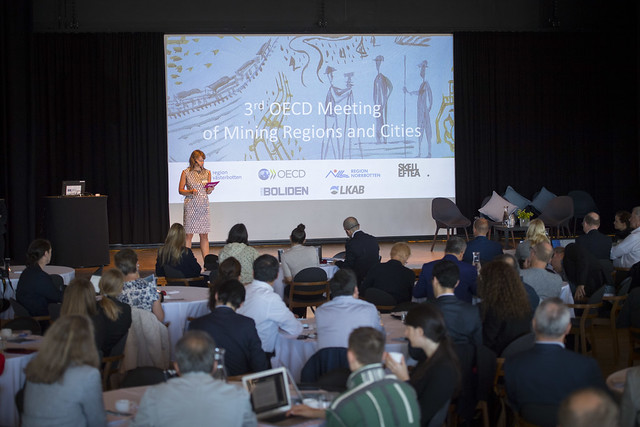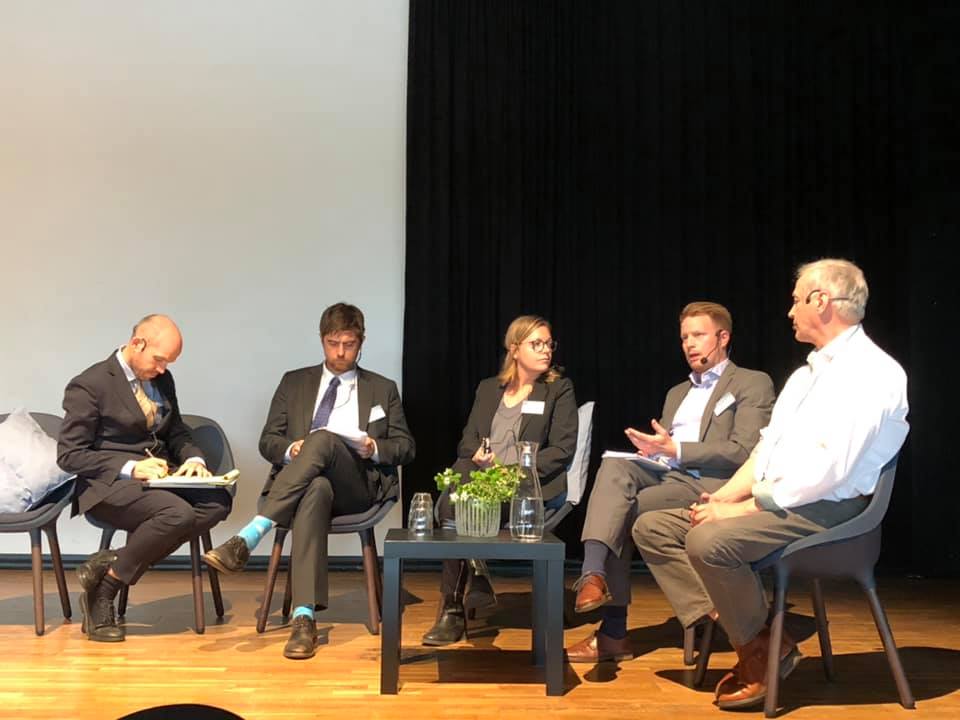European premier of the OECD’s international meeting on mining in Skellefteå
Between 12-13 of June the The Organisation for Economic Co-operation and Development, OECD, held their third international meeting on mining in regions and cities. The two previous meetings took place in Chile and Australia so it was the first time the event was arranged in Europe where Skellefteå, together with Region Västerbotten stood as hosts. About 25 different nationalities participated, where a mix of actors from the public and private sector as well as society with different connections to the mining industry got togheter.
OECD’s study on the effects of mining in Norr- and Västerbotten as a part of the OECD global project was on the agenda alongside the discussion about the critical role of mining for the transition to a sustainable energy production. The intent of the project is to offer regional development recommendations for regions and cities that are specialized in mining and extraction. It follows the study OECD created on the northernmost parts of Sweden, Finland and Norway through North Sweden for the network Northern Sparsely Populated Areas, NSPA.
OECD: s mining project
The OECD has since 2017 implemented a project aiming to develop recommendations for improved regional development of regions and cities specialized in mining industries. The project has three objectives: to develop a toolbox of recommendations and proof to market and inform on regional development strategies in mining, to produce a series of case studies that can deliver place based recommendations and help to regions and cities to better implement regional development strategies, as well as through engagement and pilot studies develop a global platform for these regions and cities to enable exchanging experiences and a dialogue between public and private sector and the local society.
Mining is crucial in the process of changing towards a climate sustainable energy production. This argument gives the mining stakeholders activities more legitimacy as mining often is seen as bad for the climate and neglectful of human rights. Important for the mining industry in the future is to implement a multisectoral way of work with social aspects, a focus on climate sustainability and regional development.
At the meeting in Skellefteå it was clear that the OECD study has contributed in making mining regions more evidence based. The OECD project pinpoints indigenous people’s issues and national governments are encouraged to change this and the territorial pilot study has contributed to create a holistic study over geographical places.
Learn more about the OECD: s project here.
Västerbotten the OECD: s study of mining in Norr- and Västerbotten
In the ongoing OECD regional study of mining in Norrbotten and Västerbotten the following themes are in focus:
- Economy, technology, and politics creating regional development mining trend and prospect sites in northern Sweden
- Current economic trend with growth possibilities and bottlenecks with a special focus on the mining sectors acting in northern Sweden
- Assessing politics, steering and implementation mechanisms (on local, regional, national and EU-level) related to a sustainable supply of raw materials and value increase and economic diversification in the region.
Before the conference in Skellefteå the OECD had put together a discussion paper with a focus on prosperity in regions with mining. In this paper, the OECD stresses the development of a new set of indicators to measure the prosperity within mining regions and before the meeting actors that could bring feedback and sharing experiences related to the studies identified challenges related to prosperity and attractive life environment were requested.
Read more about the OECD discussion paper here.
Delivering green economics and skills for the future.
The focus on the OECD mining meeting in Skellefteå was to deliver green economics and skills for the future. Questions like “How can mining be a driver of improved regional health? How can mining contribute to environmentally sustainable regions for the future but also for the current generation?” was discussed and Kristina Sundin Jonsson, director of Skellefteå municipality, started the conference by welcoming the participants.
Skellefteå city has a lot to thank mining for as mining started 150 years ago in the region with stakeholders such as Boliden and LKAB. Northern Sweden is at the center of EU mining today as it provides the EU with 80-90% of the iron production.

Kristina Sundin Jonsson, municipality Chief of Skellefteå municipality, opening the conference Photo: Patrick Trägårdh
The mines are especially active in the question of sustainable energy production and sustainability issues. Bo Krogvig, LKAB, talked about the LKAB production in the mines in Malmberget, Svappavaara, Kiruna and Narvik. LKAB’s sustainability work includes production of iron by hybrit, transformation of waste into raw materials and work according to the goals of a carbon dioxide neutral production by 2045.
According to Malwina Nowakowska-Ketterle, EU-commission general directorate Grow, EU works with mining issues through climate strategies. The member states themselves have their national climate plans and the battery alliance where northern Sweden is outstanding. In the future it will be vital to meet the production demand of a great amount of raw materials along with the restrictions of lowering carbon dioxide emissions. Almost a double of raw materials extractions is needed for the EU to meet the Paris agreement and even if mining is a national issue the laws that touches upon mining are not, according to Nowakowska-Ketterle.
Following speaker Helena Renström, Skellefteå municipality, presented that the planned battery factory Northvolt has attained full financing and explained why the establishment of Northvolt in Skellefteå is not only contributing to the city’s development but also to the bigger value of the entire EU. The tactical decision of EU to finance EU’s biggest battery factory in northern Sweden, in Skellefteå is a tactical choice, as the region has a rich mine history with relevant experiences and the right competences. With the establishment of Northvolt it will be increasingly important to focus on development to meet the challenges of the future with a wish for a growing population and improved attractive life environment. Something that will put pressure on society because the factory means a great number of employment opportunities and an increase in occupancy. In the strategy process “Skellefteå 2030” for the future the municipality is reaching out to the citizens about these questions.
- The goal is to make Skellefteå attractive and livable, which is not the same thing, says Helena Renström, communicator in Skellefteå municipality.
Learn more about Northvolt here.
Swedish challenges
In a panel discussion with OECD on the study, Nils-Olof Lindfors, Member of the Regional Executive Board in Norrbotten, Andreas Lind from the county administrative board of
Norrbotten and Pia Lindström, Sustainability Director of Boliden mining, lifted forward that the use of land, transparency and the laws are the biggest challenged that Sweden faces. The biggest problems today are that investors are scared off and that prevailing conditions makes ut difficult for companies. A better framework with more clear rules is needed to reduce polarization between stakeholders on the ground and the Swedish government.

Enrique Garcilazo and Chris McDonald from the OECD together with Pia Lindström, Andreas Lind, Nils-Olof Lindfors in a panel on mining in northern Sweden.
Indigenous people’s rights
Several workshops took place with different topics on the agenda. One of them was on the indigenous perspective on natural resource-based development. Runar Myrnes Balto, member of the Norwegian Saami parliament, spoke about the challenges that Saami people face in not being listened to concerning prospecting by the state. Comparatively to Sweden, the Norwegian Saami population has a greater possibility to affect decisions thanks to the ILO: s convention 169 signed by the Norwegian government in 2005. This means that the state has to involve the indigenous Saami in processes around land development. Jan Rannerud, member of the Swedish Saami parliament, emphasized that he would like to see the Swedish government signing the same convention giving the Swedish Saami rights to consultation at Swedish prospecting cases. Nils-Olof Lindfors, Member of the Regional Executive Board in Norrbotten, believes that Sweden should compensate the Saami population economically in some way for the Saami territory (Sápmi) that the state uses for mining. One example of a solution would be to mass produce moss that the Saami reindeer herder’s reindeer can access as they can´t roam freely in the natural resource rich northern Sweden because of mining.
/Julia Hanson
